 5 citations,
January 2017 in “Journal of Nanomedicine & Nanotechnology”
5 citations,
January 2017 in “Journal of Nanomedicine & Nanotechnology” Nanoemulgel could be a promising new treatment for hair loss.
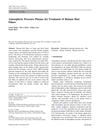 5 citations,
February 2015 in “Journal of Bio- and Tribo-Corrosion”
5 citations,
February 2015 in “Journal of Bio- and Tribo-Corrosion” Plasma jet treatments can clean hair and might replace peroxide for hair care.
 5 citations,
July 2003 in “Drug Development Research”
5 citations,
July 2003 in “Drug Development Research” Fluridil promotes hair growth safely and effectively for androgenetic alopecia.
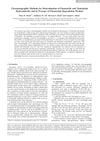 4 citations,
March 2019 in “Acta Chromatographica”
4 citations,
March 2019 in “Acta Chromatographica” Two methods can measure finasteride and tamsulosin hydrochloride; HPLC is more advantageous, while TLC offers better separation.
 4 citations,
December 2018 in “Macedonian Journal of Chemistry and Chemical Engineering”
4 citations,
December 2018 in “Macedonian Journal of Chemistry and Chemical Engineering” A new method accurately measures amino acids in treated hair, showing bleaching reduces amino acids while protein treatments increase them.
 4 citations,
September 2017 in “Skin appendage disorders”
4 citations,
September 2017 in “Skin appendage disorders” The dog with an Alopecia Areata-like condition showed signs of an autoimmune disease and partially regrew hair without treatment, suggesting dogs could be models for human AA research.
 4 citations,
May 2012 in “Tissue Engineering and Regenerative Medicine”
4 citations,
May 2012 in “Tissue Engineering and Regenerative Medicine” Scientists created three types of structures to help regrow hair follicles, and all showed promising results for hair regeneration.
 3 citations,
July 2020 in “Synthetic and Systems Biotechnology”
3 citations,
July 2020 in “Synthetic and Systems Biotechnology” Scientists improved an enzyme to better produce a hair growth-promoting chemical from an immunosuppressant.
 2 citations,
October 2022 in “International journal of Ayurvedic medicine”
2 citations,
October 2022 in “International journal of Ayurvedic medicine” Licorice has many traditional health benefits, but more research is needed to fully support these claims.
 2 citations,
January 2019 in “Biomecánica”
2 citations,
January 2019 in “Biomecánica” Hyaluronic acid and versican are important for skin healing and hair growth and might help in regenerative medicine.
 2 citations,
March 2017 in “Veterinary dermatology”
2 citations,
March 2017 in “Veterinary dermatology” Herbal paste and oil extract might improve dog hair quality by retaining lipids.
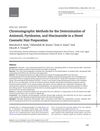 1 citations,
June 2020 in “Journal of AOAC INTERNATIONAL”
1 citations,
June 2020 in “Journal of AOAC INTERNATIONAL” Two new methods accurately measure Aminexil, Pyridoxine, and Niacinamide in hair products.
 1 citations,
January 2020 in “Indo global journal of pharmaceutical sciences”
1 citations,
January 2020 in “Indo global journal of pharmaceutical sciences” Citrullus colocynthis and Citrullus lanatus have potential health benefits but may also cause reproductive toxicity.
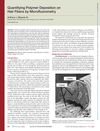 1 citations,
July 2019 in “Microscopy Today”
1 citations,
July 2019 in “Microscopy Today” Microfluorometry effectively measures how much polymer coats and penetrates hair, useful for evaluating hair products.
 1 citations,
October 2017 in “Food Additives & Contaminants: Part A”
1 citations,
October 2017 in “Food Additives & Contaminants: Part A” A new minoxidil-like substance, triaminodil, was found in an illegal hair growth supplement.
 1 citations,
September 2016 in “Springer eBooks”
1 citations,
September 2016 in “Springer eBooks” Sebum production varies by individual and is influenced by age, gender, and hormones, affecting skin and hair health.
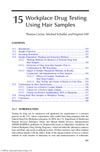 1 citations,
August 2006 in “International forensic science and investigation series”
1 citations,
August 2006 in “International forensic science and investigation series” Hair testing is a reliable method for detecting workplace drug use when done with proper sample preparation and confirmation.
 1 citations,
March 1954 in “Archives of dermatology”
1 citations,
March 1954 in “Archives of dermatology” Animal research has greatly advanced dermatology.
 July 2024 in “ADMET & DMPK”
July 2024 in “ADMET & DMPK” Surface-modified nanostructured lipid carriers can improve hair growth treatments.
 May 2024 in “International Journal For Multidisciplinary Research”
May 2024 in “International Journal For Multidisciplinary Research” The herbal hair cream helps protect and improve hair health.
 May 2024 in “Brazilian Journal of Hair Health”
May 2024 in “Brazilian Journal of Hair Health” Finasteride-loaded nanoparticles were successfully created for potential improved hair growth treatment.
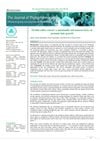 April 2024 in “The journal of phytopharmacology”
April 2024 in “The journal of phytopharmacology” Orchid callus extract can help hair grow and may be used in eco-friendly hair products.
 March 2024 in “International Research Journal of Modernization in Engineering Technology and Science”
March 2024 in “International Research Journal of Modernization in Engineering Technology and Science” The herbal shampoo made hair shinier, smoother, and softer without side effects.

The Chromolaena odorata patch significantly speeds up wound healing.
 March 2024 in “Bioimpacts”
March 2024 in “Bioimpacts” 400 nm particles penetrate hair follicles best, but mouse models aren't fully reliable for human studies.
 January 2024 in “Regenerative Biomaterials”
January 2024 in “Regenerative Biomaterials” Metal organic frameworks-based scaffolds show promise for tissue repair due to their unique properties.
 December 2023 in “Sains Malaysiana”
December 2023 in “Sains Malaysiana” The enzyme Rand protease works well for leather dehairing and its stability is important, with Leu75 playing a key role.
 November 2023 in “Global journal of medical research”
November 2023 in “Global journal of medical research” Understanding the properties of hyaluronic acid helps improve its use in facial aging treatments.
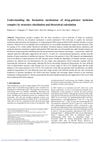
The research found how certain drugs and polymers form stable complexes, which could help develop new pharmaceutical forms.

A new system for classifying curly hair types using precise measurements can improve hair care products and cultural inclusion.






























